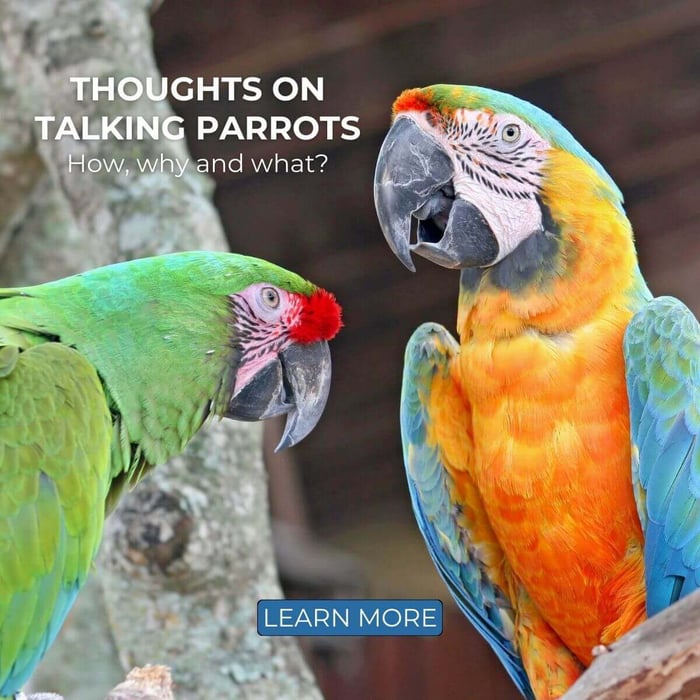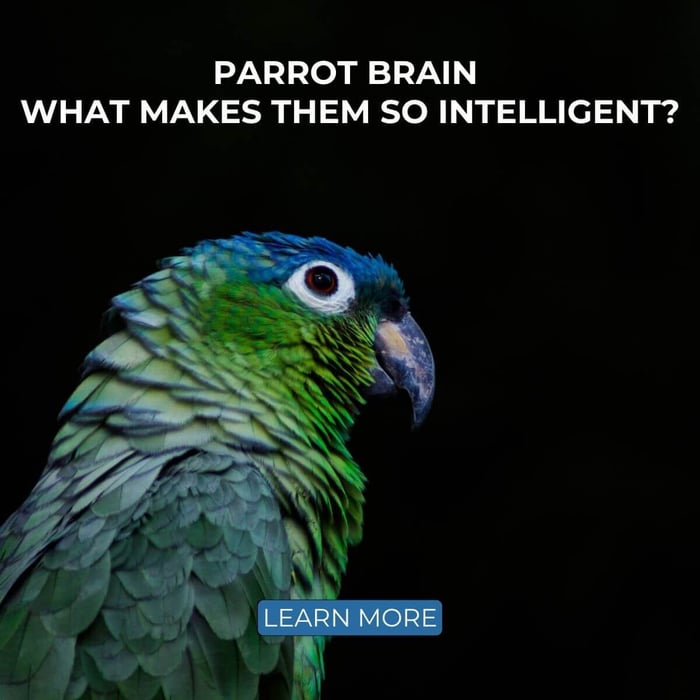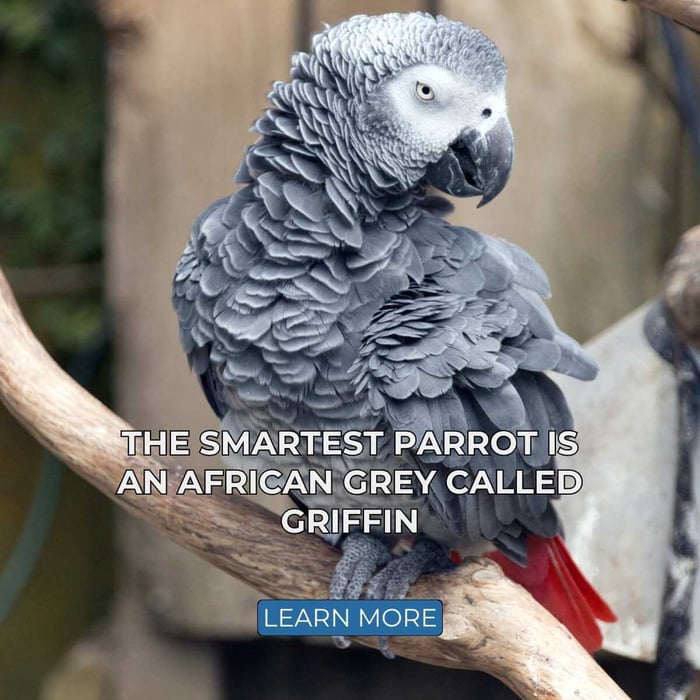Do parrots understand what they are saying?
If you’ve ever heard one of the more talkative parrots speak, you might have asked yourself: do parrots understand what they are saying? Sometimes, they nail the context so well that it absolutely seems like they don’t just speak human language but also understand it. But do they really, or are they just very good at faking it?
Keep reading for more about talking parrots, whether they understand some human language and what you can expect from your bird.
Mimicking vs understanding context vs understanding language
When we discuss talking parrots and whether they understand what they’re saying, there are some important distinctions to make. After all, it’s clear that what most parrots do is just mimic things they’ve heard repeatedly. A bird saying 'hi!' to itself in the mirror doesn’t understand what that word means. But what if it says 'hi!' every time you uncover its cage?
Understanding context
One factor that makes figuring out whether parrots actually understand what they’re saying so challenging is the fact that these birds are extremely good at figuring out the situational context of human language. Take the ‘hi!’ example: one might think that a parrot that greets you like a human would understand what it’s saying. But does it really mean that ‘hi’ is a phrase used to greet someone? In many cases, it seems the bird in question has just figured out in which context a word is used. Meaning: 'hi' is something you always say when you uncover the cage. In order to fit in, your parrot starts doing it as well.
In order to be able to say that a parrot understands what it’s saying, it’d have to be able to recognize that ‘hi’ applies in all situations where you greet someone. It doesn’t just apply when someone uncovers the cage but also when you walk into the room, when you’re out with your bird and stop to talk to an acquaintance, or when a fellow bird flies over from a spot nearby.
Can a parrot recognise a word's meaning, not just remember when it’s commonly used? Research has shown that the answer is yes. This is possible. It is, however, not very common.
African grey parrots are regarded as the most talented talkers and also the species with the most potential for understanding human language.

Understanding language
Do parrots understand what they are saying? When discussing this question, it’s impossible not to bring up the research conducted by Dr. Irene Pepperberg using her late African Grey parrot, Alex. Take the 1981 article "Functional Vocalizations by an African Grey Parrot (Psittacus erithacus)". In this publication, Pepperberg describes how her work with Alex absolutely suggests that (some) parrots have the capacity to actually understand as well as correctly use select human words. For example, she outlines how:
Alex was able to say yes or no when an object was offered to him in order to accept or reject it. This suggested he actually understood what these words mean.
Alex was able to identify objects, such as foods like corn as well as non-food items like keys. He often did so with great accuracy. He could do this even if the objects were of different size or color.
Alex was also able to request said objects from the researchers.
Although we’ll obviously never be able to have a full conversation with our parrots, working with Alex and subsequent parrots suggests that these birds have some capacity to pick up language, understand words, and use them correctly.
Cosmo
Cosmo, the African Grey, is another salient example, with researchers noting that their conclusions after studying her suggest that "she uses specific units [words or collections of words] as an adaptation of the wild parrot contact call. These results challenge the notion that parrots only imitate speech and raise interesting questions regarding the role of social interaction in learning and communicative competence in an avian species" (Colbert-White, Covington & Fragaszy, 2011) and that Cosmo modified her vocalizations "in accord with the specific context. Such modification is evidence of basic communicative competence" (Colbert-White, Hall & Fragaszy, 2015).
The note about contact calls is interesting and gives a clue as to why parrots have evolved to have such an uncanny ability to pick up speech. They’re extremely social animals and it’s very important to their wellbeing and safety to fit into the flock. If they can’t see their fellow birds, they’ll try to establish contact using contact calls. And if the fellow "birds" don’t speak parrot language, well, then they adapt!
Anecdotal "evidence"
There are also many examples outside of research settings that give one pause. Although we try to stay away from drawing conclusions from anecdotes, they definitely seem to support the notion that some parrots acquire a fascinating capacity for associating speech with context and definitely seem to cross over into the territory of actually understanding and using language to some degree.
Take this example from our post Thoughts on talking parrots: How, why and what: "(…) one day when numerous things went wrong (a leak under the kitchen sink that turned into a flood, etc., etc.). He heard me say, "Oh good grief!" time after time, in intense exasperation. After a few hours, he himself began to say, "Oh … grief!" But he always left out "good". A little later, I heard him say, "Oh, bad grief!". A while after that, he said, "Oh awful grief!".
These were expressions that he had absolutely never heard anyone say. Thinking about the phrase he had heard me use ("Oh, good grief"), he must have concluded that "good" did not make sense, for the situation in which I had used it."

Can you teach your parrot to understand language?
By now, you’re probably wondering if your parrot has the ability to reach Alex-like levels. That brings us to the crux of the story. Although we can technically say that parrots have the ability to understand what they say, we have to remember that this depends entirely on the individual as well as the circumstances. It’s not like every parrot can or will learn to use words in a manner that suggests it actually knows what they mean. Take into account the following:
Many species of parrots aren’t great talkers. Of the ones that talk, research has suggested that African Greys (genus Psittacus) have the most potential to understand, although this may also be because they have been the most frequently studied species.
Parrots like Alex grew up in a research setting with endless hours dedicated to training them. If you want to achieve anything even remotely similar, you’ll have to be prepared to invest a lot of time.
It has been shown that parrots tend to be more in tune with human speech when they’re kept alone. When kept with other parrots, which in many cases is the better option for their social well-being, they just don’t seem to care as much. This makes sense, given the explanation for the contact call discussed earlier.
Given the above, your parrot will unlikely be the next Alex, even if it’s an African grey, kept alone and showered with attention and training. That being said, a "garden variety" pet parrot can learn an impressive level of at least understanding of context.
If you spend plenty of time training your bird and labelling items, you might find it coming to you asking for a nut or to be taken to the shower. Quite useful in understanding what your companion wants! Not to mention that the time you spend on training is a double-edged sword. It gives the added advantage of strengthening your bond and providing the mental stimulation these brainy birds need.

Conclusion
So, do parrots understand what they are saying? By now, it should be clear that parrots are intelligent beings with an amazing ability to mimic humans in order to fit into the "flock". Some even manage to use words in the correct context, and a select few appear to be able to actually understand and use some human language.
If you’d like to get your parrot talking, start now! Talking training has many advantages and is just plain fun for both humans and parrots. Get your voice recording device out and give it a try.




